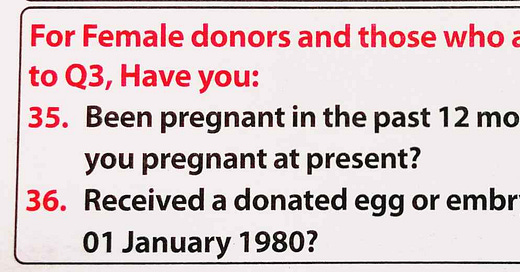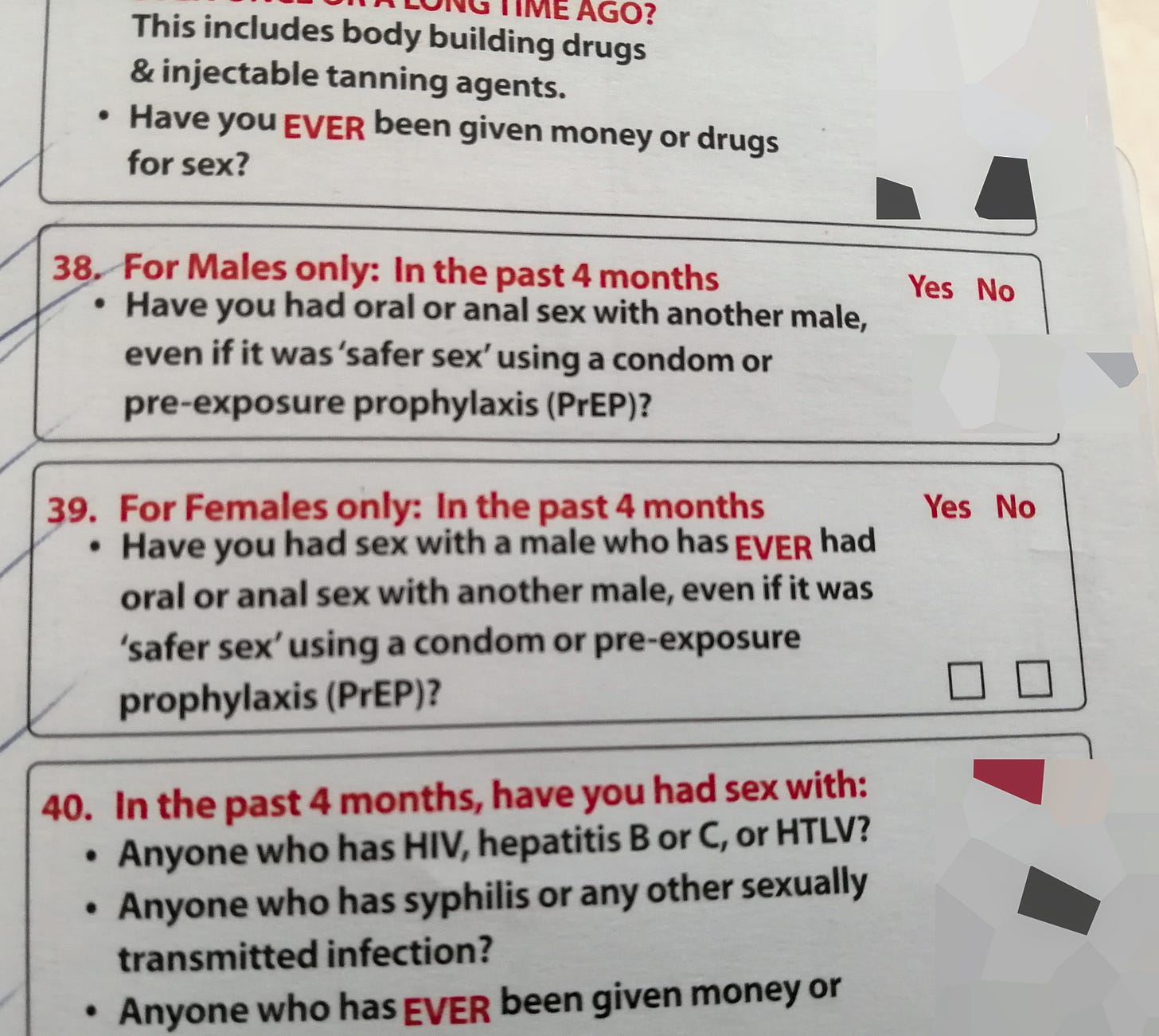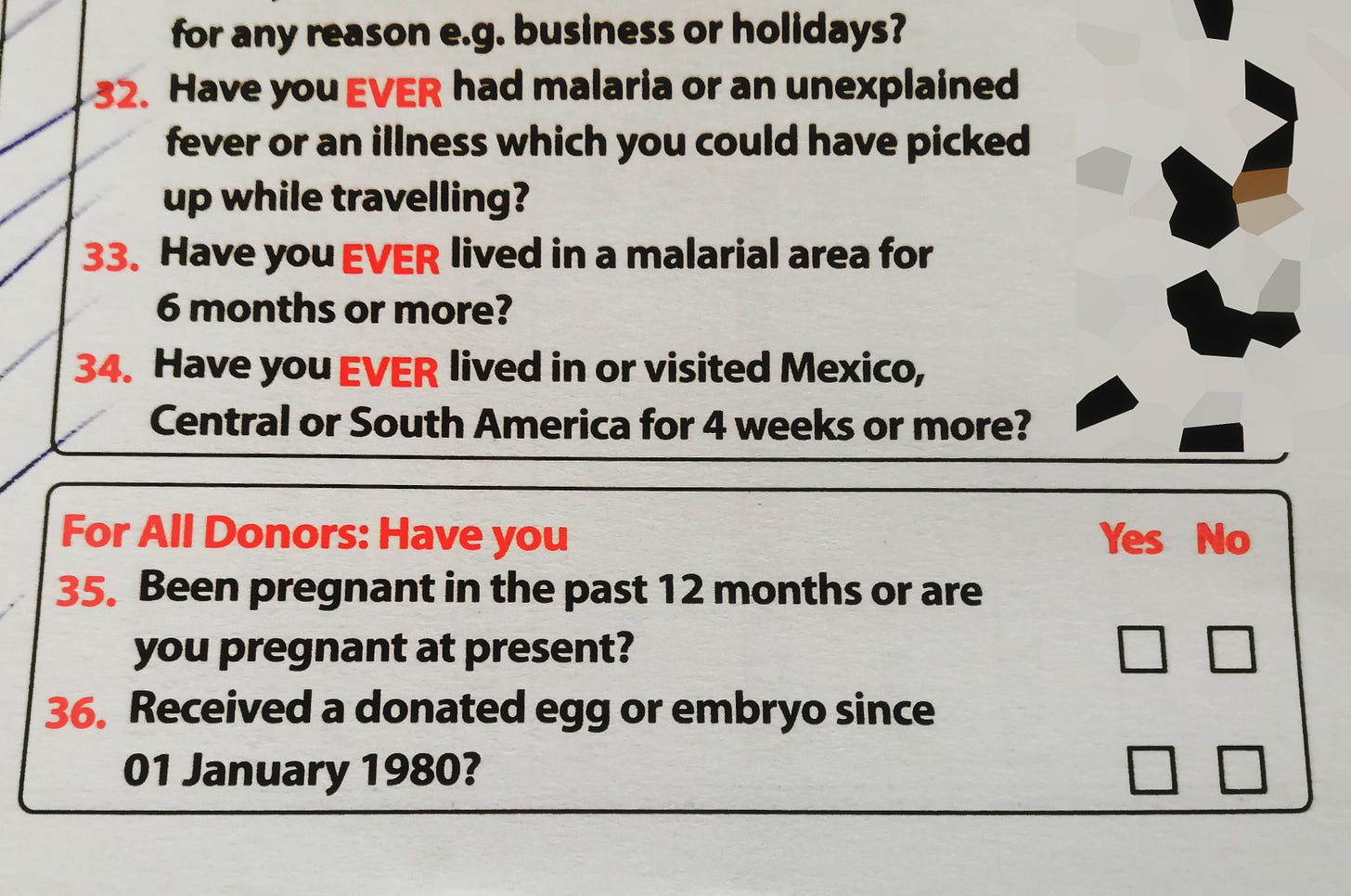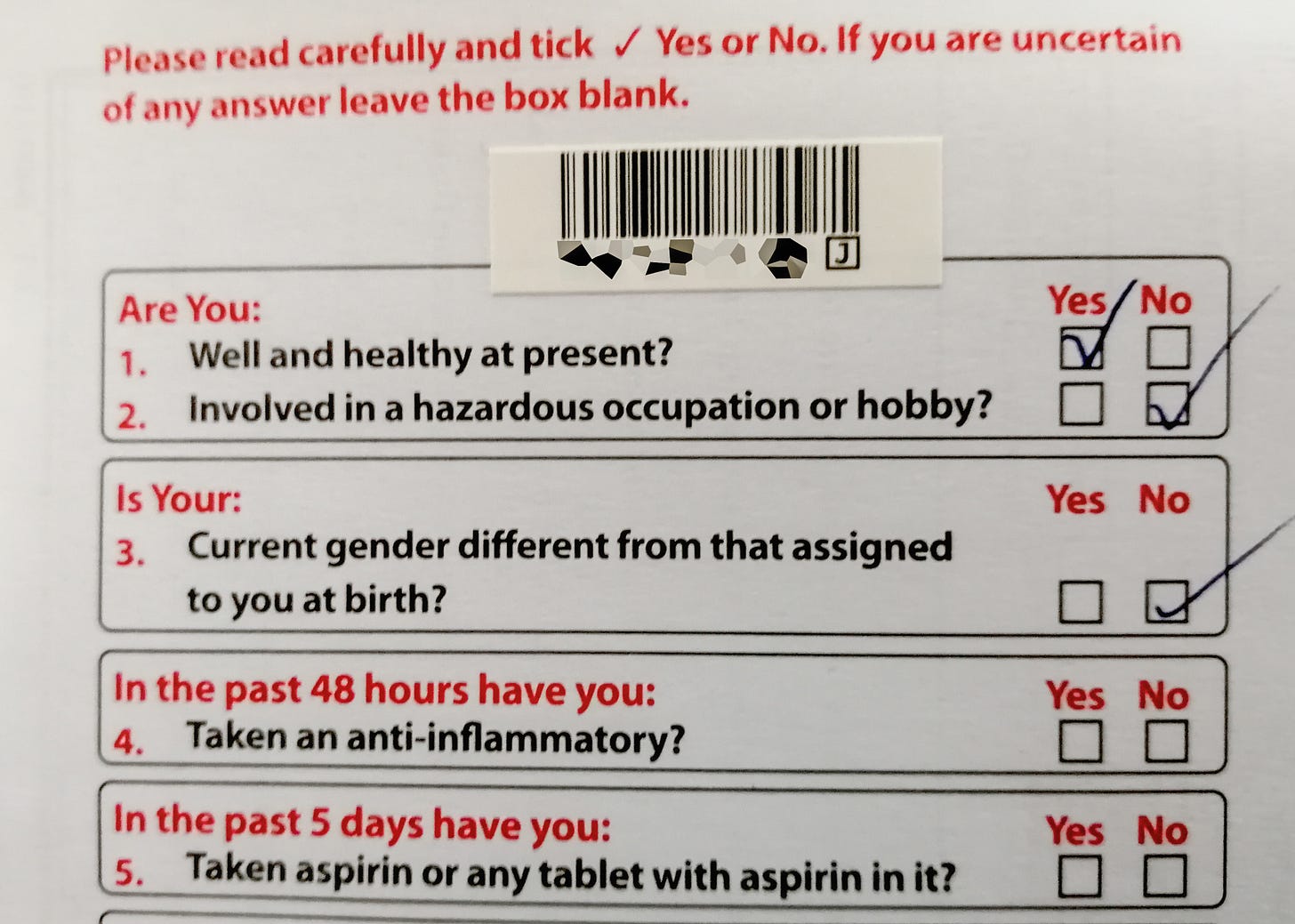An Open Letter to Orla O’Brien, Chief Executive Officer of the Irish Blood Transfusion Service
The Irish public deserve better than medical institutions spouting trendy pseudoscience
Edit: to avoid ambiguity, I want to clarify that I am using the terms “male” and “female” exclusively in reference to biological sex and not to gender.
Update, 26/01/2023: I went to make a donation this evening, and found that the donor questionnaire has been revised again. In addition to a couple of new questions having been added, the pregnancy question has been revised as below:
I am very pleased to find that the IBTS has changed course on their earlier embrace of pseudoscientific nonsense, and will no longer waste so much of their employees’ and donors’ time by asking self-identified male people if they have recently been pregnant. Common sense has (eventually) prevailed.
Update: Orla O’Brien replied to me on May 24th. The relevant passage is excerpted:
… we have taken donors’ feedback like yours on board, and have decided to direct this question [regarding pregnancy in the last twelve months] to female (including transgender female) and transgender males only. With the changes to the questionnaire, we are hopeful that we can continue to meet the required standards of safety for both donors and patients.
Dear Orla, a chara,
So it seems the day has come at last: the long march of American identity politics through European institutions has finally reached the Irish Blood Transfusion Service. I have been a regular donor ever since reaching adulthood, I make a point of donating as often as I am able (health and lifestyle permitting), and I have even signed up for the bone marrow register, although I have not yet been called to make a bone marrow donation. Hence, I’m sure you can understand the confusion and alarm with which I react to this development.
A few weeks ago, I went to donate blood in one of IBTS’s permanent clinics. For those who have never donated, the process goes as follows. The prospective donor arrives at the clinic and completes a pre-donation questionnaire, which consists of questions about their health, medical history, lifestyle, recent travel and background. A nurse then privately reviews the prospective donor’s responses with them and, if they are deemed eligible on the basis of these responses, takes a pinprick blood sample to test their iron levels. If the prospective donor’s iron levels are at the appropriate level, they are then invited to make a donation proper. The donor lies on a bed, a nurse inserts a needle into the crook of their arm and draws blood until about one pint has been extracted. Upon completion, the nurse removes the needle, covers the puncture with a sticking plaster and asks the donor to sit and rest for about twenty minutes.
I have completed the pre-donation questionnaire so many times that I could practically do it in my sleep: hence, I almost immediately noticed that the questionnaire had been slightly modified since my previous donation in November of last year. There are two sections of the questionnaire, one of which is only meant to be answered by male donors, the other only by female (see the photos below):
For Males only: In the past 4 months
Have you had oral or anal sex with another male, even if it was ‘safer sex’ using a condom or pre-exposure prophylaxis (PrEP)? Yes/No
For Females only: In the past 4 months
Have you had sex with a male who has EVER had oral or anal sex with another male, even if it was ‘safer sex’ using a condom or pre-exposure prophylaxis (PrEP)? Yes/No
Prior to the revision to the questionnaire, only female donors were asked questions regarding their reproductive health. Now, the questionnaire reads as follos:
For All Donors: Have you
Been pregnant in the past 12 months or are you pregnant at present? Yes/No
Received a donated egg or embryo since 01 January 1980? Yes/No
By asking all donors, regardless of sex, whether or not they have been pregnant in the last twelve months or received a donated egg or embryo, the tacit implication of the revised questionnaire is that male people can get pregnant. I feel a bit ridiculous pointing this out to a qualified nurse with three decades of experience in Irish healthcare, but this is patently and obviously untrue. In fact, it is a monstrously absurd perversion of basic human biology, so nonsensical that even Monty Python thought it was too ridiculous to ever actually come about.
Now, I understand perfectly well that this revision to the questionnaire was instated with good intentions, borne of a sincere desire to make the IBTS more inclusive and accommodating to transgender people.1 Up to a point, this is entirely welcome: I have no objection to the IBTS gently reminding its staff that just because a prospective donor looks like a man, that does not automatically preclude the possibility that they are actually pregnant. It may feel a bit silly, but I don’t really mind assuring a nurse that I (a six-foot-tall, broad-shouldered, flat-chested person with a beard) am not, in fact, pregnant (I’m consoled somewhat by the knowledge that the nurse probably feels equally silly asking). In my experience, most of the requests made by the trans activist community are entirely reasonable: I have no objection using female pronouns in reference to a trans woman, or referring to the individual in question as a woman if that makes her more comfortable. I mean absolutely no insult or disrespect towards trans people, and I am glad that IBTS wants them to feel welcome to donate blood.
However, the wording of the questionnaire as it currently stands has moved beyond the realm of harmless inclusivity and into the domain of outright pseudoscience. Although we might refer to trans women as women as a matter of social courtesy, the fact remains that such individuals are (biologically, medically, anatomically, whichever term you prefer) male. Male people cannot ever become pregnant, no matter how they identify or what their preferred pronouns are. No trans woman will ever conceive a child within your lifetime or mine, regardless of which medical interventions they might undergo: the only people who can become pregnant are female people, regardless of how they identify. Every human who has gotten pregnant in the history of our species was female, not male. A pregnant person might go by the name “William” and wear a handlebar moustache, but they are female all the same.
Why am I kicking up such a fuss about this? As I mentioned above, it’s hardly the first time American identity politics have made an unwelcome incursion into an Irish public or semi-public institution (the subject of the first post on this newsletter). I don’t really care that much if an Irish journalist or humanities lecturer agrees with ridiculous assertions like “male people can become pregnant”, “the Earth is flat” or “evolution is a lie”.
But a medical institution making such preposterous assertions is quite another matter. I care a great deal about the beliefs and qualifications of someone I am allowing to insert a steel needle into my arm.
Unlike in many countries, blood donors in Ireland receive no financial compensation for their service: Irish hospitals are entirely dependent on unpaid volunteers for blood supplies, and these volunteers are in perennially short supply. You are asking the Irish public to volunteer their free time, truthfully answer enormously invasive and intimate questions about their health and lifestyle, and undergo a moderately uncomfortable medical procedure at regular three-month intervals - entirely out of the goodness of their hearts. Given how dependent IBTS are on the goodwill of the Irish public, the institution’s medical credibility is of paramount importance. Donors have the right to expect the IBTS to be good stewards of both their blood and their private information: they have the right to expect that their blood is being withdrawn, stored and used only by qualified medical professionals. A medical institution spouting patently, unambiguously false statements about basic human biology like “any human can become pregnant, regardless of sex” inspires about as much confidence in the institution as a self-identified mechanic who professes ignorance as to which end of the car the engine sits in. It either makes the organisation seem incompetent and unqualified (for believing in an obviously untrue statement about medical science) or cowardly (for pretending to believe this obviously untrue statement due to public pressure from activist groups).
The most absurd part of this craven stunt is that it has the potential to seriously undermine the Irish public’s faith in the medical credibility of the IBTS, in service of a goal which hardly seems worth achieving. It’s a solution in search of a problem. What is the theory of harm here? Are you concerned that a trans man might read the questionnaire and become so insulted at the outrageous insinuation that only female people can become pregnant that they refuse to donate for the rest of their lives?2 Speaking from experience, I have yet to knowingly encounter anyone in person (up to and including any trans people, who are disproportionately common in my own social circle) who literally believes that trans woman are anatomically female, or who believes that trans women are just as capable of becoming pregnant as cisgender women. The only people who are offended by statements like “only female humans can become pregnant” are a vocal minority of extremely online trans activists who trumpet their scientific illiteracy as if it were a virtue. They do not represent the views of the general Irish public. They do not even represent the views of most transgender people. The best response to such nonsensical demands is not to concede them but to ignore them.
This is where Ireland has arrived in 2022: a public health institution suicidally undermining its own medical credibility, and for no better reason than because some extremely sad people on Twitter with far too much time on their hands asked them to.
I strongly urge you to reconsider this absurd decision, revise the pre-donor questionnaire such that the questions it asks are in keeping with our best understanding of human biology and medical science, and arrest the progress of this unsettling trend towards modern science denialism.
Yours, etc.
First Toil, then the Grave
Lest anyone think that this revision to the pre-donation questionnaire is unrelated to transgender activism or a simple formatting oversight, see the third question on the questionnaire:
Is your current gender different from that assigned to you at birth?
I’m a little confused as to why the IBTS is asking me questions about my “gender identity” at all, given that it’s a private thought inside my brain, with about as much bearing on my blood as my taste in music or fondness for kittens. Not only that, but the IBTS apparently considers my gender identity a trait of such grave importance that it must be asked before asking me if I’ve recently travelled to a malaria-riddled area, or if I have recently had sex with prostitutes. And it doesn’t stop there: IBTS is intending to revise the questionnaire even further to include options for non-binary people to identify as such.
Once again, I simply must ask: how is this relevant? Does the fact that a person “identifies as” non-binary have the slightest impact on the levels of iron or haemoglobin in their bloodstream? Why are you instructing your staff to ask donors irrelevant pointless questions which have absolutely nothing to do with whether they can or cannot donate blood? When I go to make my next donation, will the questionnaire ask me whether I’m a member of the Church of Ireland, or if I enjoy the flavour of coriander? Surely your staff must have more important things to be getting on with.
Not to mention the fact that many trans people would be ineligible to donate because of the impact of hormone replacement therapy on their haemoglobin levels, as the IBTS itself freely acknowledges.









Imagine being this upset at a banal and inconsequential attempt at inclusivity, chill out.